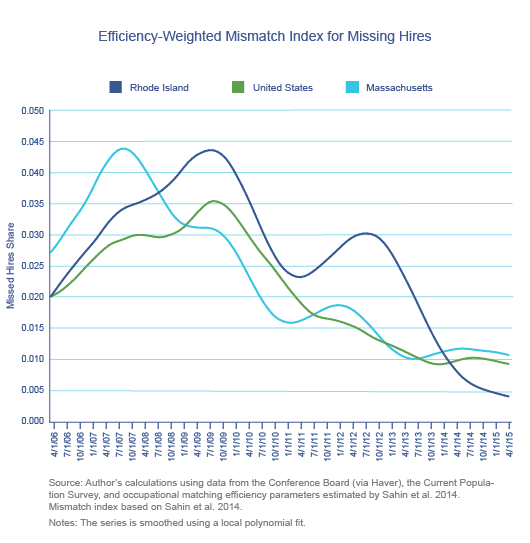2015 Series • No. 2015–7
Current Policy Perspectives
The Rhode Island Labor Market in Recovery: Where is the Skills Gap? 
There has been much anecdotal evidence claiming that Rhode Island's labor force is unable to supply the skills that the state's employers seek. The anecdotal evidence has given rise to the concern that labor market mismatch is holding back the state's economic recovery. Such a concern comes with particularly high stakes in the case of Rhode Island, which suffered the most severe drop in employment in New England during the Great Recession and has endured the region's highest unemployment rate during the recovery. This paper conducts a data-driven analysis of several indicators of potential labor market mismatch in Rhode Island in order to ascertain whether the state does indeed suffer from a skills gap that significantly restrains employment growth.

 Key Findings
Key Findings
- During the 2001-2015 period, the share of the Rhode Island labor force with a college degree increased by 9 percentage points, a figure that is 2 percentage points greater than the increase in the college share for the aggregate U.S. labor force over the same period. Based on this result, Rhode Island's labor force does not appear deficient relative to the overall U.S. labor force.
- A "missed hires" index using the unemployment shares and vacancy shares by occupation, adjusted for differences in matching efficiency across occupational categories, shows that the index increased between 2006:Q2 and 2009:Q3, when it peaked at 4.3 percent. This means that the actual number of hires in 2009:Q3 was 4.3 percent lower than it would have been if labor market mismatch had not been present. The index begins to trend downward in 2009:Q4, goes up in early2011 through late 2012, but then abates so that by 2015:Q2, mismatch restrained hires by 0.4 percent and blunted employment growth by 0.03 percentage points.
- Workers regularly flow across the border between Rhode Island and Massachusetts, so commuting patterns can offer evidence of occupational and geographic mismatch. Between 2010 and 2013, commuting rates out of Rhode Island increased (on net) among workers with some college and among those with a high school diploma or less, and decreased among those with a bachelor's degree or higher. During this same period, the share of Rhode Island jobs filled by workers commuting from Massachusetts increased, mainly for jobs requiring at least a college degree. Since 2001, there has been an upward trend in nonresident employment in Rhode Island, especially for jobs filled by college-educated workers. These latter findings accord with recent anecdotal evidence that Rhode Island employers have found it difficult to fill highly-skilled positions from the pool of workers residing in Rhode Island.

 Exhibits
Exhibits


 Implications
Implications
Some indicators of mismatch presented in the paper suggest that in recent years, Rhode Island's labor market imbalances reflected changes related to the business cycle rather than a structural mismatch between the labor force and the jobs available. However, other results support the presence of mismatch within the resident labor force?for example, the fact that nonresidents have increasingly filled jobs located in Rhode Island that require a college education. Hence, there may be some welfare justification for training Rhode Island residents to fill jobs available in the state, thereby reducing the social costs of commuting.

 Abstract
Abstract
This paper assesses the extent to which Rhode Island's workforce lacks skills that are in demand among the state's current and potential employers and, if so, whether such a skills gap or labor market "mismatch" significantly restrains employment growth in the state. Using an index developed by Sahin et al. (2014), we find that occupational mismatch in Rhode Island increased leading up to and during the Great Recession and fell back to pre-recession levels by mid-2013. In 2015:Q2, occupational mismatch restrained quarterly employment growth in Rhode Island by an estimated 0.03 percentage points. However, since 2013 Rhode Island's employment growth rate has exceeded its long-run average, suggesting that the current extent of mismatch in the state is no greater than its long-run average level. Nonetheless, the share of Rhode Island-based jobs filled by out-of-state workers has increased significantly since 2001, a trend driven by jobs that employ college-educated workers. This evidence agrees with some Rhode Island employers' claims that they have trouble filling skilled jobs with Rhode Island resident workers. While this finding suggests that at the broader regional level, occupational mismatch is not a serious problem, regional welfare might yet be improved by training Rhode Island workers to fill such positions.



